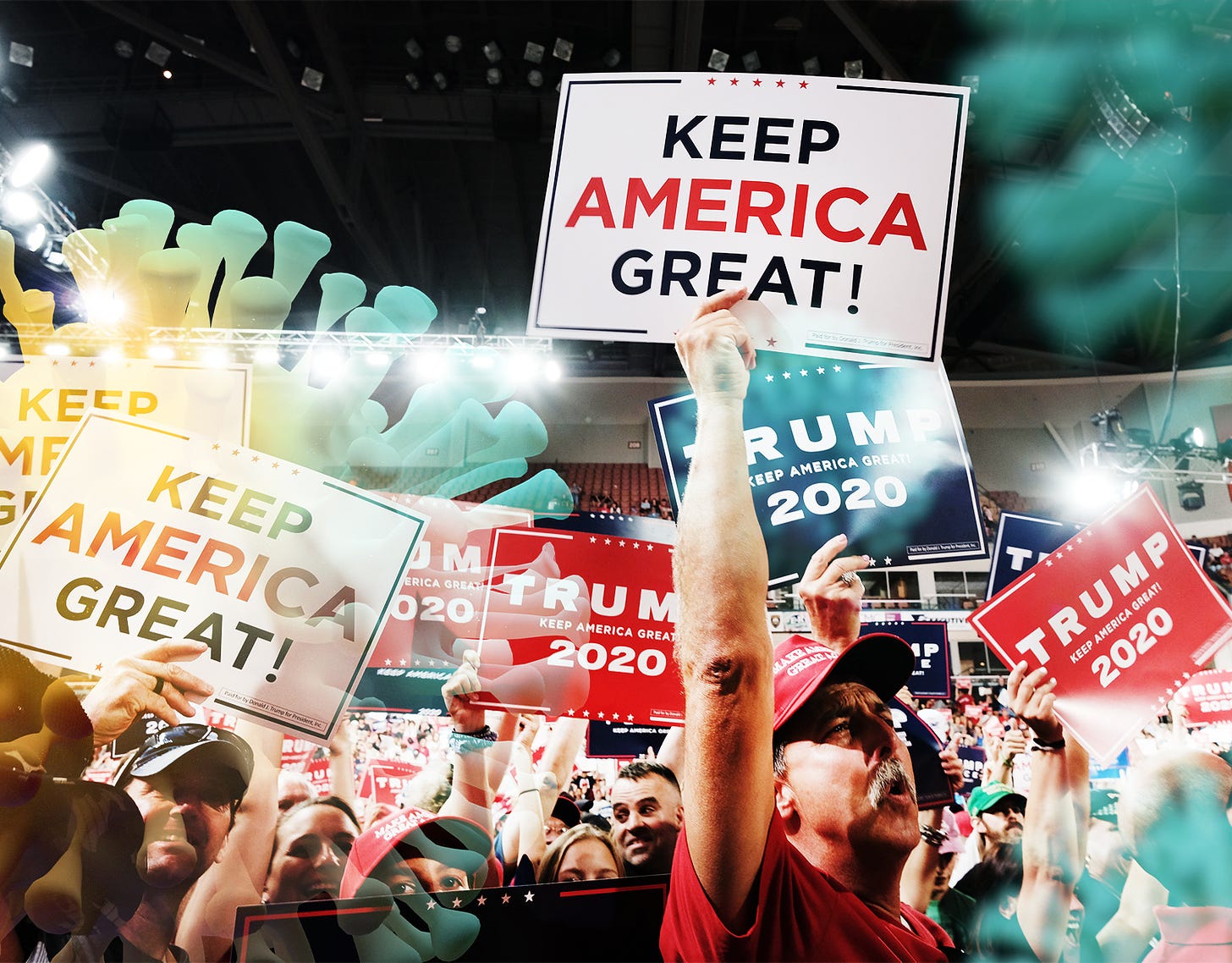Will the Coronavirus Kill Trump’s Reelection Campaign?
If the virus causes a global economic downturn, the president will lose his proudest accomplishment.
The economic gods do not favor President Trump’s re-election bid.
While no can know how serious the coronavirus epidemic will prove to be in the United States, it is not too early to know that the epidemic is infecting the global economy and world financial markets. This makes it all too likely that President Trump will be campaigning for reelection with the U.S. economy in the throes of a nasty recession and with the worst stock market record for a first-term president in the post-war period.
Among Trump’s economic misfortunes is the fact that the coronavirus epidemic has taken hold in countries that are systemically important to the world economy. These countries now include China, Italy, Japan, and South Korea, which are all now experiencing major economic slowdowns.
China’s economic cardiac arrest is of particular concern given that China is the world’s second-largest economy, the world’s largest consumer of internationally traded commodities, and was until recently the major engine of economic growth.
All indications now suggest that after growing at an annual 6 percent rate, the Chinese economy will record significantly negative growth in the first half of 2020. Most notably, six weeks after the Chinese lunar year, China’s coal consumption is still down about 35 percent, automobile sales are down about 80 percent, China’s exports are plummeting, and tens of millions of Chinese workers remain locked down.
Negative growth in China is already disrupting global supply chains and leading to a plunge in Chinese imports. It is also causing a rout in international commodity prices and will soon lead to a wave of defaults in China’s over-indebted corporate sector.
The coronavirus epidemic also already appears to be decimating the Italian economy, which is the Eurozone’s third-largest economy. Italy’s tourist sector is collapsing as travel plans are canceled, while Italy’s northern industrial heartland has ground to a halt as around 16 million workers have been placed on lockdown. This makes a return of the Italian sovereign debt crisis before the end of the summer all too likely. That has the potential to pose a real threat to the Euro’s survival and to further rattle global credit markets as it did in 2012.
Perhaps Trump’s greatest economic misfortune is that the coronavirus epidemic has occurred at a time when global equity market valuations, including that of the United States, have been stretched, and at a time when global credit risk has been seriously mispriced. Global investors and lenders had been sleeping peacefully on the assumption that the world economy would remain on a favorable growth path forever, but the coronavirus is rudely shaking them awake.
Of course, things would get worse for the U.S. and global economies if fear of the spread of the virus were to induce American consumers and investors to scale back demand, as their counterparts abroad have already done. However, with all of the financial market turmoil going on, even if the coronavirus spread in the U.S. were to be contained, it is difficult to see how the U.S. could avoid a recession before voters go to the polls in November.
According to the Federal Reserve’s own estimates, a 20 percent decline in the U.S. equity market would subtract around 1.25 percent from GDP. Worse yet, past experience would suggest that a major credit crunch brought on by a weak economy would have an even more devastating effect on investor demand and consumer confidence.
To date, taking all of the credit for things that go well and dishing out all of the blame for things that go poorly has worked well as a political strategy for Trump. However, it remains to be seen whether that strategy will hold up in November when voters go to the polls. That strategy is now encountering a stock market dive all too reminiscent of 2008 and it is still to confront a full-blown recession.
Voters will likely recognize that the coronavirus epidemic was not of Trump’s making. However, they will probably ask whether the president made matters worse by repeatedly downplaying the severity of the crisis and by proposing large cuts to the Center for Disease Control's budget on the very eve of the epidemic.
They are also likely to ask how much sense the 2017 tax cut, Trump’s signature policy initiative, made. By causing the U.S. budget deficit to balloon, that initiative will be seen to have left the U.S. with little fiscal policy ammunition to combat the economic effects of the coronavirus epidemic.
Voters might not choose to keep “Making America Great” if that means depleted bank accounts and diminished economic prospects.
Editor's note 3/12/2020, 2:40 p.m.: An earlier version of this article states that federal public health funding had been cut in recent years. While the Trump administration proposed cuts, they were not enacted.



